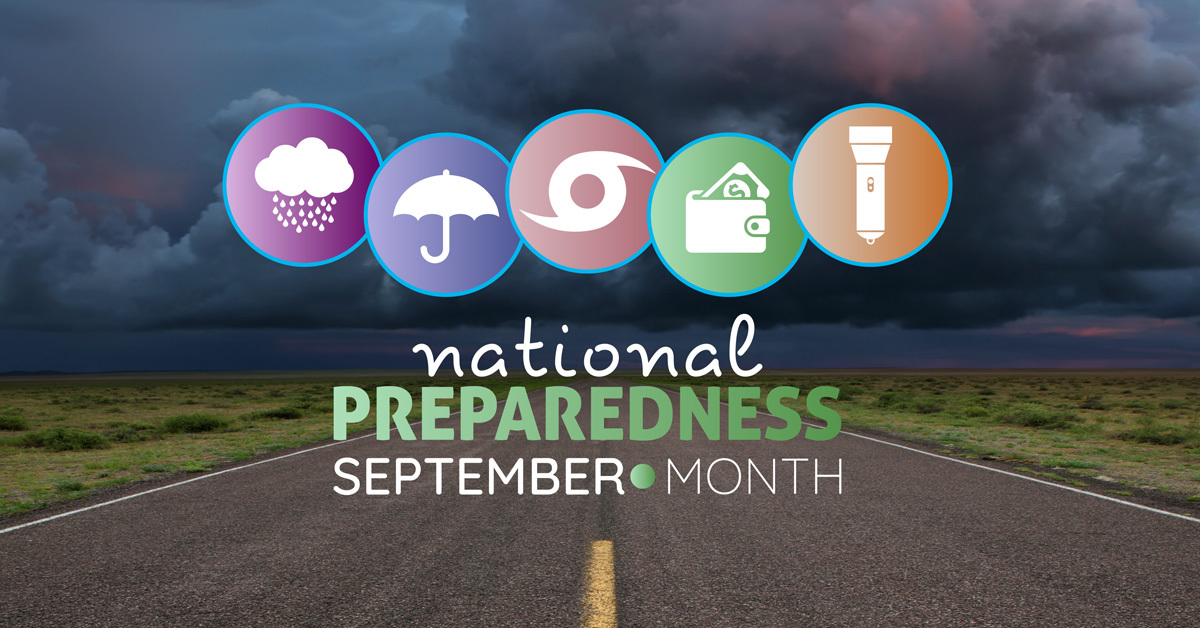You’ll never regret being prepared

In all your ways acknowledge Him, and He will make straight your paths. – Proverbs 3:6
September: ‘National Preparedness Month’
Our Atlantic Coast communities know all too well that hurricane season runs from June through November each year. Those in the West can attest to the fact that there is also a peak fire season from July through October, with September and October being
the most vulnerable months. About 70% of tornadoes occur between March and June in the Midwest.
Whether it’s the risk of a natural disaster like the ones listed above, or a cyber-attack, Concordia Plans wants to help our LCMS communities be safe and resilient in the face of any emergency scenario. This month’s wellness newsletter aims
to unpack what can seem like an overwhelming task of preparing for the unknown. Keep reading to learn more from the Federal Emergency Management Agency (FEMA) and Ready.gov about preparing your home and loved ones for the known and unknown risks in your area.
When should I start? TODAY!
Don’t fret! These simple, inexpensive or FREE steps can help you prepare now:
- Test your smoke alarms and carbon monoxide detectors every month. Change the batteries in your smoke alarms and/or carbon monoxide detectors at least once a year. Replace your smoke alarms and carbon monoxide detectors every 10 years.
- Know what kind of disasters and emergencies are most common for where you live.
- Create your emergency communication plan. Use FEMA’s free template to conveniently record important contact and medical information about your family, which you then can share with others and store both digital and paper copies.
- Keep important phone numbers somewhere in addition to your cell phone.
- Sign up for emergency alerts in your area to receive life-saving information from your state and local municipality.
- Download the FEMA App (available in English and Spanish) to receive weather alerts, safety tips and reminders and be ready for the unexpected.
- Build your emergency supply kit over time. Start with items you may already have in your home, like a flashlight, extra batteries, copies of important documents, water and non-perishable food. When you go to the grocery store, you can pick up an extra item each time that you use regularly, especially if it’s on sale!
- Talk with family or members of your household about where you will go if told to evacuate. Having a plan before disaster strikes can help you save precious time and money.
- Store important documents and items such as passports, birth certificates, maps and electronics in a flood-safe place like a high shelf or upper floor in resealable water-tight plastic bags to help waterproof them. Make sure insurance policies are stored digitally.
- Contact your local fire department. They may have programs that provide fire or carbon monoxide detectors.
- Check online for free or discounted CPR courses offered near you and take the course! (Remember, you can earn Vitality Points by submitting proof of completion!)
- Visit Floodsmart.gov to know your area’s level of flood risk.
- Download free preparedness resources.
Use this checklist to help make a plan.
What about your finances?
Your finances need preparation as well. Concordia Plans offers financial recommendations and resources that can be accessed via our website. Financial Educator Laura Scheer will cover tried-and-true ways to build your emergency fund.
Rebuilding lives after a disaster or another emergency is challenging and stressful for all involved. Having access to personal financial, insurance, medical and other records is crucial for starting the recovery process quickly and efficiently.
Financial preparedness tips
- Gather financial and critical personal, household and medical information and store if in a flood-safe place.
- Consider saving money in an emergency savings account that could be used in any crisis. Keep a small amount of cash at home in a safe place. It is important to have small bills on hand because ATMs and credit cards may not work during a disaster when you need to purchase necessary supplies, fuel or food.
- Obtain property (homeowners or renters), health and life insurance if you do not have them. Not all insurance policies are the same. Review your policy to make sure the amount and types of coverage you have meets the requirements for all possible hazards. Homeowners insurance does not typically cover flooding, so you may need to purchase flood insurance from the National Flood Insurance Program.
- For more helpful financial preparedness tips, download the Emergency Financial First Aid Kit (EFFAK) to get started planning today.
Ready.gov also warns us to be safe and cautious.
Unfortunately, not everyone reaching out after a disastrous event is looking to provide help. In this fallen world, there are people who look to take advantage of those in vulnerable situations. Here are a few tips to protect yourself from scams:
- Be cautious about sharing personal financial information, such as your bank account number, Social Security number or credit card number.
- Do not click on links in texts or emails from people you don’t know. Scammers can create fake links to websites.
- Remember that the government will not call or text you about owing money or receiving economic impact payments.
- Be aware that scammers may try to contact you via social media. The government will not contact you through social media about owing money or receiving payments.
- Keep in mind that scammers may try to take advantages of financial fears by calling with work-from-home opportunities, debt consolidation offers and student loan repayment plans.
- Contact the Federal Trade Commission (FTC) at ftc.gov/complaint if you receive messages from anyone claiming to be a government agent.

Do you know how much life insurance you need?
Knowing how much life insurance you need is another way to be prepared for the unexpected. Benefit Scout, available through your Concordia Plans benefits, can help. While your financial needs, goals and dreams may change, protecting your loved ones will
always be important. This tool allows you to take a quick assessment and receive your “fit summary” with recommendations on how much life insurance you really need to.
Complete your assessment with Benefit Scout and earn 100 Vitality points!
- Login in to Benefit Scout.
- Complete the assessment.
- Head to Vitality and submit a screenshot of the recommendations to the “Financial Wellness” category in your Points Planner.
Just remember: Preparation isn’t all about “doom and gloom.” We serve a gracious, loving God, who is our refuge in times of trouble, in times of joy and everything in between.
In all your ways acknowledge Him, and He will make straight your paths. – Proverbs 3:6
I find these Contemporary Christian songs uplifting and to be a helpful reminder of God’s sovereignty and provision:
- “Firm Foundation” by Cody Carnes
- “Praise You in This Storm” by Casting Crowns
You may also have a Christian song or hymn that reminds you that God is your refuge and hope during times of the unknown.